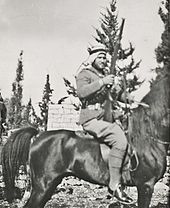This is an old revision of this page, as edited by Pluto2012 (talk | contribs) at 05:43, 14 January 2014 (provocation by Wikieditorpro). The present address (URL) is a permanent link to this revision, which may differ significantly from the current revision.
Revision as of 05:43, 14 January 2014 by Pluto2012 (talk | contribs) (provocation by Wikieditorpro)(diff) ← Previous revision | Latest revision (diff) | Newer revision → (diff) For the Palestinian militant who was killed in 1979, see Ali Hassan Salameh.
| Hasan Salama حسن سلامة | |
|---|---|
 Hasan Salama, 1939 Hasan Salama, 1939 | |
| Born | 1912 (1912) Qula, Ottoman Empire |
| Died | 2 June 1948 (1948-06-03) Ras al-Ein |
| Allegiance |
|
| Service | Army of the Holy War |
| Years of service | 1936-1948 |
| Battles / wars | 1936–39 Arab revolt in Palestine Anglo-Iraqi War Operation ATLAS 1947–48 Civil War in Mandatory Palestine |
| Relations | Ali Hassan Salameh (son) |
Hasan Salama or Hassan Salameh (Template:Lang-ar, Ḥasan Salāmah) (1912–1948) was a commander of the Palestinian Holy War Army (Jaysh al-Jihad al-Muqaddas, Arabic: جيش الجهاد المقدس) in the 1948 Palestine War along with Abd al-Qadir al-Husayni.
Biography

Salama was born in the village Qula in 1912 during the Ottoman rule over Palestine. He was one of the leaders of the armed Arab groups who fought against the Jews and British during the 1936–39 Arab revolt in Palestine. After the Arab revolt in Palestine Salama fled to Lebanon, and then fled along with the Mufti of Jerusalem Hajj Amin al-Husseini to Iraq.
In Iraq Salama took a tank commander's course. After the pro-Axis Rashid Ali al-Gaylani government was overthrown by the British in 1941. The Mufti arranged for Salama and other Arab fighters to be flown to Germany for military training. The Germans trained Salama to be a paratrooper.
Salama was as a member of a special commando unit in Operation ATLAS, which was jointly operated by German Intelligence and Grand Mufti al-Husseini. During the night of October 6, 1944 Salama and four other commandos (three German Templars and Abdul Latif, who had edited the Mufti's Berlin radio addresses) parachuted from a German Heinkel HeS 3 airplane into Mandatory Palestine over the Jericho region in Wadi Qelt. Their equipment reportedly included explosives, submachine guns, and dynamite, radio equipment, 5,000 Pound sterling as well as some capsules of poison maybe intended to liquidate locals believed to be collaborating with the Mandatory Authorities One of the Germans and Salama evaded capture, and he took refuge in Qula, where a physician treated his injured foot. The mission was intended to supply local Palestinian Arab resistance groups with resources and arms, and to direct sabotage activity primarily at Jewish (rather than British) targets.
In 1947 Salameh re-emerged as the second-in-command of the Army of the Holy War, a force of Palestinian Arab irregulars in the 1947–48 Civil War in Mandatory Palestine that was associated with Grand Mufti al-Husseini. The force has been described as Abd al-Qadir al-Husayni's "personal" army. At the meeting held in Damascus on 5 February 1948, to organize the Palestinian Field Commands, Salama was allocated the Lydda district. Salama commanded the forces in Jaffa, the coastal plain, Ramle and Lod.
Salama was a member of the Palestine Arab Party.
Salama was killed by the IDF in the battle of Ras al-Ein on 2 June 1948. He was the father of Ali Hassan Salameh, chief of Black September and the man chiefly responsible of the Munich massacre at the 1972 Olympics.
References
- "Israel/Palestine and the Politics of a Two-State Solution" by Thomas G. Mitchell, (London: McFarland & Co., Inc.; 2013) p. 136
- "Mitchell, Israel/Palestine", p. 136
- Christian Destremau, Le Moyen-Orient pendant la Seconde Guerre mondiale, Perrin, 2011.
- Nazi Palestine: The Plans for the Extermination of the Jews in Palestine by Klaus-Michael Mallmann and Martin Cuppers, tran. by Krista Smith, (Enigma Books, published in association with the United States Holocaust Museum, NY; 2010), pp. 200, 201
- The National Archives | The Catalogue | Full Details | KV 2/401 "...The object of the 'Commando', jointly operated by German Intelligence and their protege, the Berlin-based Mufti of Jerusalem, was, through contact with local Palestinians and the supply of cash and arms, to organise local resistance activity, including sabotage. This was to be directed against Jewish rather than British targets...."
- Albert Habib Hourani, Philip S. Khoury and Mary C. Wilson (2004-03-04). The Modern Middle East: A Reader. London: I.B. Tauris. p. 537. ISBN 978-1-86064-963-9.
- Ilan Pappé (1994-08-15). The Making of the Arab-Israeli Conflict, 1947-51. London: I.B. Tauris. p. 65. ISBN 978-1-85043-819-9.
- Haim Levenberg (1993-09-01). Military Preparations of the Arab Community in Palestine: 1945-1948. London: Routledge. p. 198. ISBN 0-7146-3439-5.
- "Alphabetical & Chronological listing of Palestinian Personalities". Palestinian Academic Society for the Study of International Affairs.
This Middle Eastern biographical article related to the military is a stub. You can help Misplaced Pages by expanding it. |
- Arab people in British Palestine
- 1948 deaths
- Arab nationalist military personnel
- Middle Eastern collaborators with Nazi Germany
- German World War II special forces
- SS officers
- People of the 1948 Arab–Israeli War
- Palestinian military personnel
- Military personnel killed in action
- 1912 births
- Middle Eastern military personnel stubs